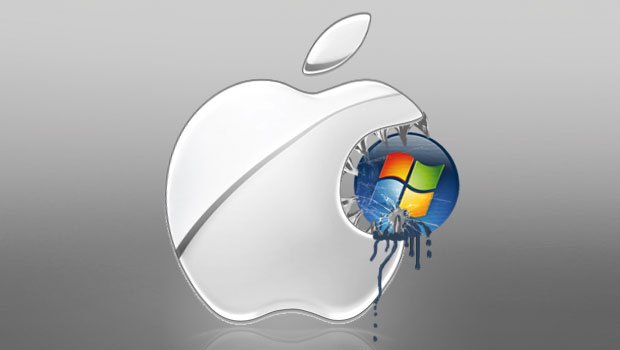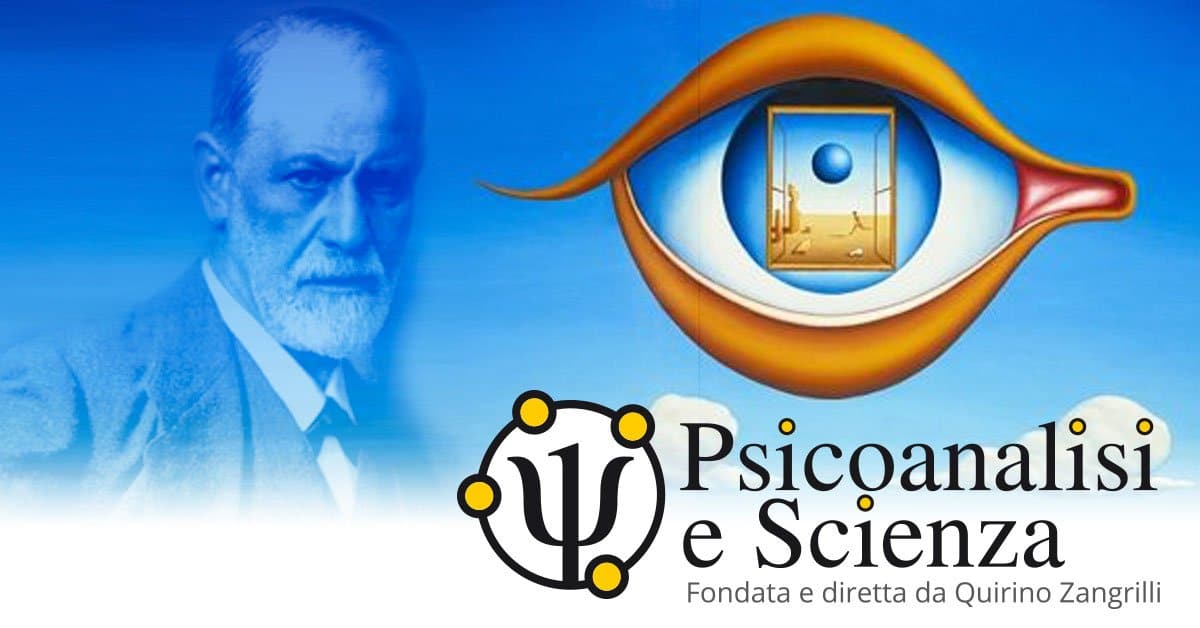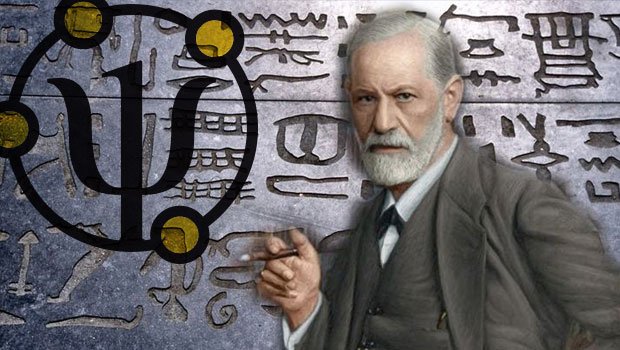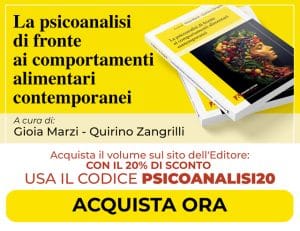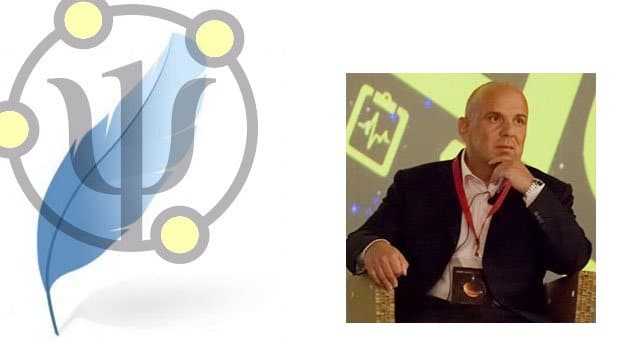
This brief preamble is needed to inform the reader that I sufficiently know both operative systems to be able to make, half jokingly, some considerations drawing from my professional competences.
I well know that recently the Windows platform makes use of a less desperate operative system than the preceding one, but I know just as well the evidence, that can only be denied by Windows fanatics, of the absolute stability of Mac with OsX compared to the tendency of Windows’s crashing.
The psychoanalyst is a strange being: his aptitude of disassembling the real data (analysis from an etymological point of view, as everybody knows, means decomposition) leads him to question phenomena which others would find banal or insignificant. Well: I have always ask myself why a human being who could use a reliable appliance, easy to use and intuitive, prefers instead to waste his time using an operative system characterized by crashes, instability, hardware installation problems, viruses, etc.
Leaving behind the masochistic component of the human psychism (everybody, more or less, has unconscious feelings of guilt to expiate and that beautiful frozen screen is an excellent occasion for penitence after having spent two hours on Photoshop!) I believe that the mental structure of the Mac users is different to that of the Windows disciples. The difference is that which passes from animism to the acquisition of hypothetico-deductive thought.
In an article much more serious than this one entitled “Trauma, memory and cybernetic structure of the mind” I reminded: “Many experts of cybernetic like to affirm, «The human mind is structured as a computer». It seems to me to be a very particular way to proceed. It would probably be better to say that man has architected in a conscious, preconscious and unconscious way the computers on the basis of the structure of his mind. We know how great a part the projection in the human inventive has”.
It is obvious that this fact is true for the hardware projection as well as for the software one. To understand why a human being insists on using a fatiguing, farraginous, unreliable and unpredictable system, there is a simple and very common explanation in psychoanalysis: that activity which rationally seems uneconomic and heralding sufferance, unconsciously determines a pleasure which does not appear in a manifest way.
In simple terms, the Windowsman enjoys himself in a manner that “… you people – who use Mac – wouldn’t believe”. The pleasure derives from two fundamental components: the tutelage of one’s own omnipotent experience and the repetitive performing of the so-called “compulsion to repeat”. Don’t be afraid: these concepts are no more difficult than ‘directory’ or ‘loop’ or other tricks which you may be familiar with. I’ll explain, the human being is born drenched with omnipotence: each child thinks that every event in the world depends on him. In simple terms, he places himself “at the centre of the universe”. As fragile as a twig in the infinite cosmos the child must safeguard his idea that the world is, at the most, an extension of himself.
The tiring and endless activity of configuration, optimization and messing about, which the Windowsman computes in a daily manner in order to obtain performances that the honest Mac machine autonomously supplies us with, safeguards the omnipotence of the user and his illusion that the machine is his own creature that he can command with magic arts.
Furthermore, the compulsion to repeat is by definition the unconscious and irrepressible necessity to put oneself in an invariably painful situation, even if absurd and humiliating. Freud discovered it during the observation of a particular game of a child, in this case, his nephew Ernst. A pushing away and bringing to game, of “Fort-Da” (gone and there). Freud’s nephew often repeated a game, which can be commonly seen by anybody who lives with small child: he would throw a wooden reel away from himself, out of his sight, exclaiming: “Fort!”, (Gone!) and “Da!” (There!).
After that, the child, who was far from stupid being Freud’s nephew, tied a thread to the reel, automating the game, throwing it repeatedly over the edge of his cot and pulling it back to himself saying: “Fort! … Da!”. What was at stake – Freud hypothesized – was the control of the anguish produced by losing the object (the wooden reel which symbolized the mother). *
This is the game that the Windows’s user plays: seeing with anguish his work disappear, sweating frantically attempting to reanimate the system, downloading drivers, patches, tricks and the more one has the more one uses, to safeguard the illusion that he is the master of the machine.
Every time that he reanimates it and the windows reappear as by magic on the screen to evaporate the drops of cold sweat that bead his forehead, he delights deeply with his re-found omnipotence.
We poor Mac users accept the idea of having faithful, silence and discrete servers, who don’t ask us for anything and perform autonomously the assigned tasks: they are apart from us.
We know this well when we leave them on standby for a week and then at the first touch of the keyboard they come to life as if they had just drunk four cups of steaming coffee! Am I joking? Am I being serious? I’ll go and ask a good psychoanalyst and then I’ll let you know…
Written by: Quirino Zangrilli © Copyright
Translated by Linda De Nardo
Notes:
* “This was, thus, the complete game (Freud writes) disappearance and reappearance – of which he was able to perform, as a rule, only the first part, untiringly repeated as a separate game, even though the main pleasure was undoubtedly tied to the second part of the game… the child was compensated, in a manner of speaking, for this renunciation (the disappearance of his mother AN) by staging the act of the disappearance and the reappearance making use of the objects that he was able to reach” (S. Freud, Beyond the Pleasure Principle , Works, 1920)
E’ autore di 74 tra libri e pubblicazioni scientifiche. Ha partecipato in qualità di relatore o di presidente di sessione a numerosi Convegni scientifici nazionali ed internazionali.
Il suo libro “La vita: involucro vuoto”, pubblicato da Borla nel 1993, è in adozione dal 1994 presso la Cattedra di Psicologia Dinamica dell’Università di Torino.
Nel 1994 gli viene assegnato il “Premio Nazionale Ciociaria per la Medicina”.
E’ l’ideatore e fondatore della rivista multimediale “Psicoanalisi e Scienza”, la più seguita rivista di psicoanalisi on line al mondo in lingua italiana (Fonte: Entireweb, Alexa, Google, Virgilio, Arianna., etc.). Nel 2012 partecipa come Relatore alla Rassegna Scientifica di BergamoScienza.
Nel 2013 espone i suoi studi sull’nterazione materno-fetale nella Sessione Speciale dell’ XI Congresso Mondiale di Medicina Perinatale a Mosca con la relazione “Intrauterine Imprinting”.
Nel 2024 riceve il Premio Accademico d’Onore della Accademia Culturale Internazionale Cartagine 2.0.
Nel 2024 docente ad Almaty – Kazakhstan presso il workshop di psicoanalisi sul tema della violenza, promosso dall’Università di psicoanalisi di Mosca in collaborazione con l’Istituto svizzero di micropsicoanalisi.
Nel 2025 pubblica come curatore il libro “LA PSICOANALISI DI FRONTE AI COMPORTAMENTI ALIMENTARI CONTEMPORANEI” presso Armando Editore
Nel 2025 pubblica il libro “PSICOANALISI DEL TRAPIANTO D’ORGANO – IL VISSUTO DELL’ALIENO” presso Armando Editore
Doctor Quirino Zangrilli was born in Fiuggi in 1955. Graduated with honours in Medicine and Surgery in 1980, he practices Psychoanalysis, with intensive method, since 1982.
He is author of 74 scientific pubblications. He has attended as speaker or president of session to many national and international scientific Conventions.
His book “La vita:involucro vuoto” (Life: empty involucre), published by Borla in 1993, has been in use by the Chair of Dynamic Psychology at Turin’s University since 1994.
He is the author and founder of the multimedia review “Psicoanalisi e Scienza” (Psychoanalysis and Science), the most read Italian on line review of psychoanalysis.
In 2012 he participated as a Speaker at the Scientific Festival of BergamoScienza.
In 2013 he illustrated his research on the maternal-fetal interaction in the Special Session of the XI World Congress of Perinatal Medicine in Moscow with his relation “Intrauterine Imprinting”.
He is visiting teacher at Moscow Institute of psychoanalysis and training psychoanalist of Swiss Institute of Micropsychoanalysis.
In 2024 he is a teacher in Almaty – Kazakhstan at the psychoanalysis workshop on the topic of violence, promoted by the Moscow University of Psychoanalysis in collaboration with the Swiss Institute of Micropsychoanalysis.
In 2024 he received the Honorary Academic Award of the Carthage 2.0 International Cultural Academy
In 2025 he published as an editor the book “PSYCHOANALYSIS IN THE FACE OF CONTEMPORARY EATING BEHAVIOURS” at Armando Editore
In 2025 he published the book “PSYCHOANALYSIS OF ORGAN TRANSPLANTATION – THE EXPERIENCE OF THE ALIEN” at Armando Editore
Le Le Docteur Quirino Zangrilli est né à Fiuggi en 1955. Diplômé avec mention en Médecine et Chirurgie en 1980, il pratique la psychanalyse depuis 1982, en utilisant une technique intensive.
Il est l’auteur de 74 livres et publications scientifiques.
Il a participé en tant que conférencier ou président de session à de nombreuses conférences scientifiques nationales et internationales.
Son livre “La vie : enveloppe vide”, publié par Borla en 1993, est adopté depuis 1994 par la Chaire de Psychologie Dynamique de l’Université de Turin. En 1994, il a reçu le “Prix national Ciociaria de médecine”.
Il a conçu et fondé le magazine multimédia “Psicoanalisi e Scienza”, qui est le magazine de psychanalyse en ligne en italien le plus suivi au monde. (Source : Entireweb, Alexa, Google, Virgilio, Arianna., etc.).
En 2012, il a participé en tant que conférencier à la colloque scientifique de BergamoScienza.
En 2013, il a exposé ses études sur l’interaction materno-fœtale lors de la session spéciale du XIe Congrès mondial de médecine périnatale à Moscou avec le rapport “Intrauterine Imprinting”. Il est chargé d’enseignement au cours de spécialisation de trois ans en psychanalyse, psychothérapie psychanalytique et consultation psychanalytique à l’Université de Moscou.
Il est membre didacticien de l’Institut Suisse de Micropsychanalyse et de la Commission pour la Pratique de celui-ci.
En 2024, il enseigne à Almaty – Kazakhstan à l’atelier de psychanalyse sur le thème de la violence, promu par l’Université de Psychanalyse de Moscou en collaboration avec l’Institut Suisse de Micropsychanalyse.
En 2024, il reçoit le Prix Académique Honoraire de l’Académie Culturelle Internationale Carthage 2.0.
En 2025, il publie en tant qu’éditeur le livre « LA PSYCHANALYSE FACE AUX COMPORTEMENTS ALIMENTAIRES CONTEMPORAINS » chez Armando Editore
En 2025, il publie le livre « PSYCHANALYSE DE LA TRANSPLANTATION D’ORGANES – L’EXPÉRIENCE DE L’ÉTRANGER » avec Armando Editore
В 2024 году является преподавателем в Алматы – Казахстан на семинаре по психоанализу на тему насилия, проводимом Московским университетом психоанализа в сотрудничестве со Швейцарским институтом микропсихоанализа.
В 2024 был награжден Почетной академической премией Академии Международной Культуры «Карфаген 2.0».
В 2025 году он опубликовал в качестве редактора книгу «ПСИХОАНАЛИЗ В РАМКАХ СОВРЕМЕННОГО ПИЩЕВОГО ПОВЕДЕНИЯ» в издательстве Armando Editore
В 2025 году он опубликовал книгу «ПСИХОАНАЛИЗ ТРАНСПЛАНТАЦИИ ОРГАНОВ – ОПЫТ ЧУЖОГО» совместно с Армандо Эдиторе

